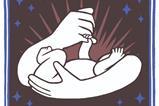Joshua Luke Smith explains how a pair of boots taught him to be grateful for every blessing. No matter how much you have given, you have received more

A few years ago, we spent Christmas with my wife’s parents in Canada. It was a winter wonderland - snow heavy on the ground, lights twinkling on every house. On Christmas morning, my mother-in-law handed me a gift. I hadn’t asked for anything, so I was surprised when I tore off the wrapping paper and gasped. Inside was a pair of Red Wings boots - something I’d dreamed of owning one day but never expected to have anytime soon. I laced them up immediately, strutting around the room in joy.
The only thing I asked for this Christmas, years later, was to have my Red Wings tended to. I took them to a cobbler who passionately told me how he would recondition the leather, repair the stitching, replace the eyeholes, and then resole and dye them. I beamed the entire time. Every winter, when I put them on, I’m reminded of the gift they are to me, and I need only look down at my feet to feel a tide of gratitude rise within me. I couldn’t have afforded those boots, and so their presence in my life is a disruption; it provokes me to remember how little I have contributed and how much I have received. When I walk around with them on, I repeat to myself with each step, “It’s all a gift, it’s all a gift, it’s all a gift.”
James, the brother of Jesus, wrote, “Every good and perfect gift is from above, coming down from the Father of lights.” (1:17) It’s a lofty idea, but one that resonates. I remember when my daughter first called out for us in the night, unsettled by the shadows on the wall, it took time to convince her that they weren’t to be feared. She’ll grow up to understand that shadows are only ever present when a light is shining and only form when something is in the way of its glow.
When we reorientate our lives to view all that is good as a gift, we’re stripped of the entitlement which stands before the light, forcing shadows onto the wall. Scarcity and control, greed and resentment form like monsters made out of hands shaped into contortions. I know this well. I know what it is to live like an orphan, believing every meal is your last and that you are solely responsible for the successes you achieve. You live haunted by the shadows. You fight for your life and demand that others acknowledge the work you’ve put in because, without it, what do you have?
Jesus told a story about a prodigal son who squandered his inheritance on reckless living. When he returned home, ashamed and expecting punishment, his father ran to him with open arms and threw him a lavish party. But there’s a detail often overlooked: when the younger son asked for his inheritance early, the father divided his estate between both sons. Later, when the elder brother complained about never receiving so much as a goat to celebrate with his friends, the father reminded him, “You are always with me, and everything I have is yours.” Despite living in abundance, the elder brother could only see what he lacked.
Entitlement robs us of joy by making us work for what we already have. It blinds us to the gifts right in front of us. I’ve been that older brother, missing the generosity surrounding me because I was too busy counting what I thought I deserved.
When my daughter was small, she once called out in the night, scared of the shadows on her wall. I lay beside her, stroked her hair, and prayed with her. Then I said, “Think of all the good things.” Together, we listed them: her friends, the food she ate, the family who loves her. That phrase - “think of all the good things” - has stayed with me. It doesn’t erase the reality of pain or darkness but helps redirect my attention to the light shining within it.
The Psalmist wrote, “Even though I walk through the valley of the shadow of death, you are with me.” (23:4) Even death, the sharpest pain we face, is but a shadow - a distortion of the truth that will one day be restored. Jesus offered similar wisdom when he spoke about worry: “Look at the birds of the air; they do not sow or reap or store away in barns, and yet your heavenly Father feeds them. See how the flowers of the field grow. They do not labour or spin, yet not even Solomon in all his splendour was dressed like one of these.” (Matthew 6:26) His antidote to anxiety was simple: observe the world’s quiet rhythm of receiving.
What if we lived as though everything we have, no matter how hard we’ve worked for it, is a gift? What if every moment was an invitation to gratitude? My Red Wings remind me of this truth. Every step I take in them is a declaration: “It’s all a gift, it’s all a gift, it’s all a gift.






































No comments yet